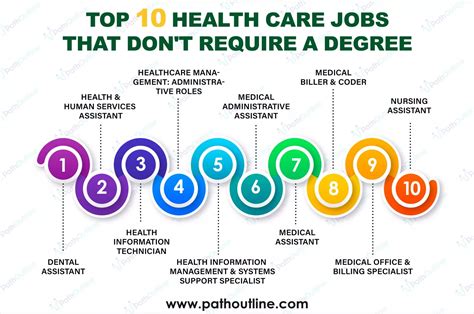Intro
Discover medical jobs without a degree that offer entry-level opportunities for a rewarding career in healthcare. Explore various roles, such as medical assistants, healthcare administrators, and medical billing specialists, that require little to no formal education. Learn about the required skills, training, and certifications for these in-demand positions.
The healthcare industry is one of the fastest-growing sectors in the world, with a wide range of job opportunities available for individuals with varying levels of education and experience. While many medical jobs require a degree, there are several entry-level opportunities that can be pursued without one. These jobs can serve as a stepping stone for those who want to start their career in healthcare or pursue further education in the field.

Benefits of Entry-Level Medical Jobs
Entry-level medical jobs offer several benefits, including:
- Opportunity to gain hands-on experience in the healthcare industry
- Chance to develop new skills and build confidence in a medical setting
- Potential for career advancement and professional growth
- Competitive salaries and benefits
- Sense of fulfillment and satisfaction from helping others
Types of Entry-Level Medical Jobs
There are several types of entry-level medical jobs that do not require a degree. Some of these include:
- Medical Assistants: Medical assistants work alongside healthcare professionals to perform administrative and clinical tasks. They may take vital signs, prepare patients for exams, and assist with medical procedures.
- Medical Receptionists: Medical receptionists are responsible for managing the front desk of a healthcare facility. They may answer phones, schedule appointments, and handle patient records.
- Pharmacy Technicians: Pharmacy technicians work in pharmacies, assisting pharmacists with dispensing medication and handling patient transactions.
- Dental Assistants: Dental assistants work in dental offices, assisting dentists and hygienists with patient care and administrative tasks.
- Medical Billers and Coders: Medical billers and coders work behind the scenes, processing medical claims and assigning codes for insurance reimbursement.
Requirements for Entry-Level Medical Jobs
While a degree may not be required for these entry-level medical jobs, there are still certain requirements that must be met. These may include:
- Certification: Many entry-level medical jobs require certification, such as the Certified Medical Assistant (CMA) or the Certified Pharmacy Technician (CPhT) credentials.
- Training: Some entry-level medical jobs may require specialized training, such as a medical assisting program or a pharmacy technician course.
- Background Check: Many healthcare facilities require employees to undergo a background check before starting work.
- Vaccinations: Some healthcare facilities may require employees to receive certain vaccinations, such as the flu shot.

How to Get Started in an Entry-Level Medical Job
If you're interested in pursuing an entry-level medical job, here are some steps you can take to get started:
- Research: Research different types of entry-level medical jobs to find one that aligns with your interests and skills.
- Training: Look into training programs or courses that can help you develop the skills and knowledge you need for your chosen career.
- Certification: Check if certification is required for your chosen career, and research the certification process.
- Job Search: Search for job openings in your area, and tailor your resume and cover letter to the specific job you're applying for.
- Networking: Network with professionals in your chosen field to learn more about the job and get tips on how to succeed.
Conclusion
Entry-level medical jobs can be a great way to start your career in healthcare, even if you don't have a degree. By researching different types of jobs, getting the necessary training and certification, and networking with professionals in your field, you can set yourself up for success in a rewarding and challenging career.

Final Thoughts
If you're passionate about helping others and want to start your career in healthcare, consider exploring entry-level medical jobs. With the right training and certification, you can set yourself up for success in a rewarding and challenging career.
What are some common entry-level medical jobs?
+Some common entry-level medical jobs include medical assistants, medical receptionists, pharmacy technicians, dental assistants, and medical billers and coders.
Do I need a degree to work in an entry-level medical job?
+No, many entry-level medical jobs do not require a degree. However, some may require certification or specialized training.
How can I get started in an entry-level medical job?
+To get started in an entry-level medical job, research different types of jobs, get the necessary training and certification, and network with professionals in your field.
